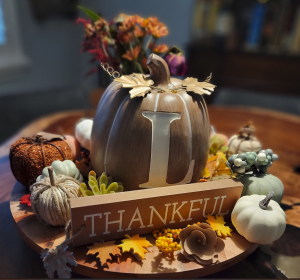Nurturing Mental Health During Thanksgiving: A Season of Gratitude and Self-Care
As the Thanksgiving holiday approaches, many of us eagerly anticipate the joy of gathering with loved ones, sharing delicious meals, and expressing gratitude for the blessings in our lives. However, amidst the festive atmosphere, it’s crucial to recognize the impact this season can have on mental health. While Thanksgiving is a time of celebration, it can also bring about stress, loneliness, and anxiety for some individuals. This article explores the intersection of mental health and the Thanksgiving holiday, emphasizing the importance of self-care and fostering a supportive environment.

The Pressure of Expectations:
Thanksgiving often comes with a set of expectations—perfectly cooked meals, harmonious family gatherings, and an abundance of joy. However, these expectations can be overwhelming and contribute to heightened stress and anxiety. It is essential to acknowledge not every celebration will mirror a picture-perfect scene from a holiday movie. Embracing imperfections and understanding it is okay for things not to go as planned can significantly alleviate the pressure.
Coping with Loneliness:
For some individuals, Thanksgiving may amplify feelings of loneliness, especially if they are unable to be with loved ones. Factors such as distance, work commitments, or strained relationships can contribute to a sense of isolation. In these situations, it is crucial to find alternative ways to connect with others, whether through virtual gatherings, phone calls, or volunteering in the community. Recognizing and addressing feelings of loneliness is a proactive step toward maintaining good mental health during the holiday season.
Gratitude as a Mental Health Tool:
While Thanksgiving is synonymous with expressing gratitude, incorporating gratitude into our daily lives can have lasting positive effects on mental health. Research has shown that practicing gratitude can enhance overall well-being, reduce stress, and improve relationships. During the holiday season, take intentional moments to reflect on the positive aspects of your life, no matter how small. Whether it’s a supportive friend, a fulfilling hobby, or a moment of peace, acknowledging gratitude can foster a positive mindset.
Self-Care Strategies:
Amidst the hustle and bustle of holiday preparations, it’s easy to neglect self-care. However, prioritizing mental well-being is crucial for navigating the Thanksgiving season with resilience. Establishing boundaries, setting realistic expectations, and allocating time for rest are essential components of self-care. Whether it’s enjoying a quiet moment alone, practicing mindfulness, or engaging in activities that bring joy, incorporating self-care into your holiday routine can contribute to a healthier mental state.
Creating a Supportive Environment:
Thanksgiving is an opportunity to cultivate a supportive and understanding environment for those struggling with mental health challenges. Encourage open conversations about well-being, be empathetic to others’ experiences, and foster an inclusive atmosphere that values the diversity of emotional experiences during the holiday season. By destigmatizing mental health discussions, we can contribute to a more compassionate and understanding community.
Conclusion:
As we approach Thanksgiving, let us not only celebrate the joys of the season but also prioritize mental health and well-being. By acknowledging the potential stressors, practicing gratitude, and embracing self-care, we can create a more compassionate and supportive holiday experience for ourselves and those around us. Thanksgiving is not just about the feast on the table; it’s an opportunity to nourish our minds and hearts, fostering a sense of gratitude and resilience that extends beyond the holiday season.


Leave a Reply